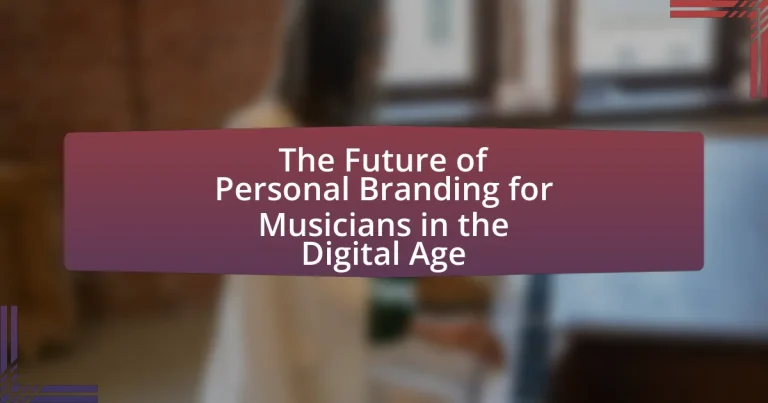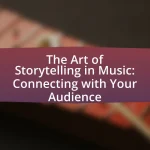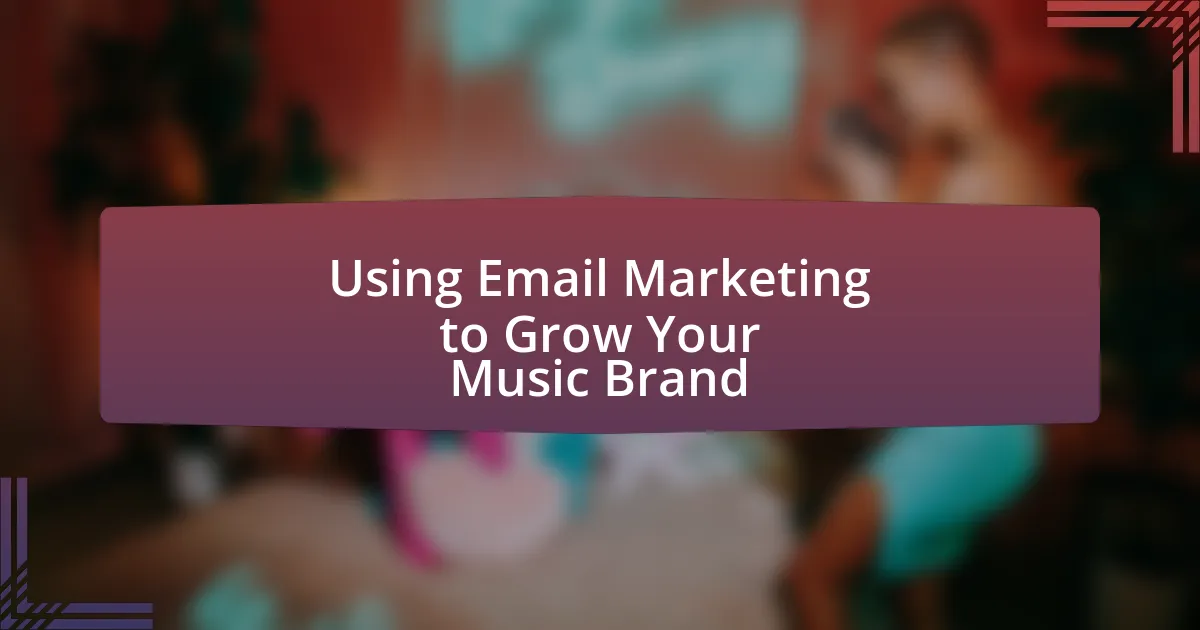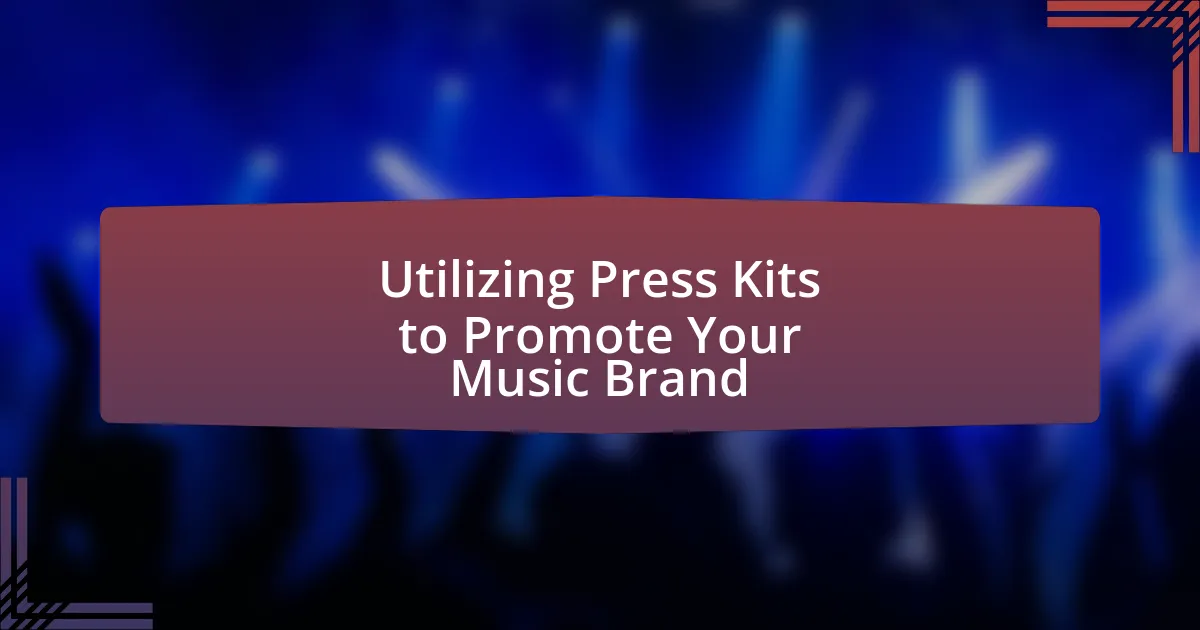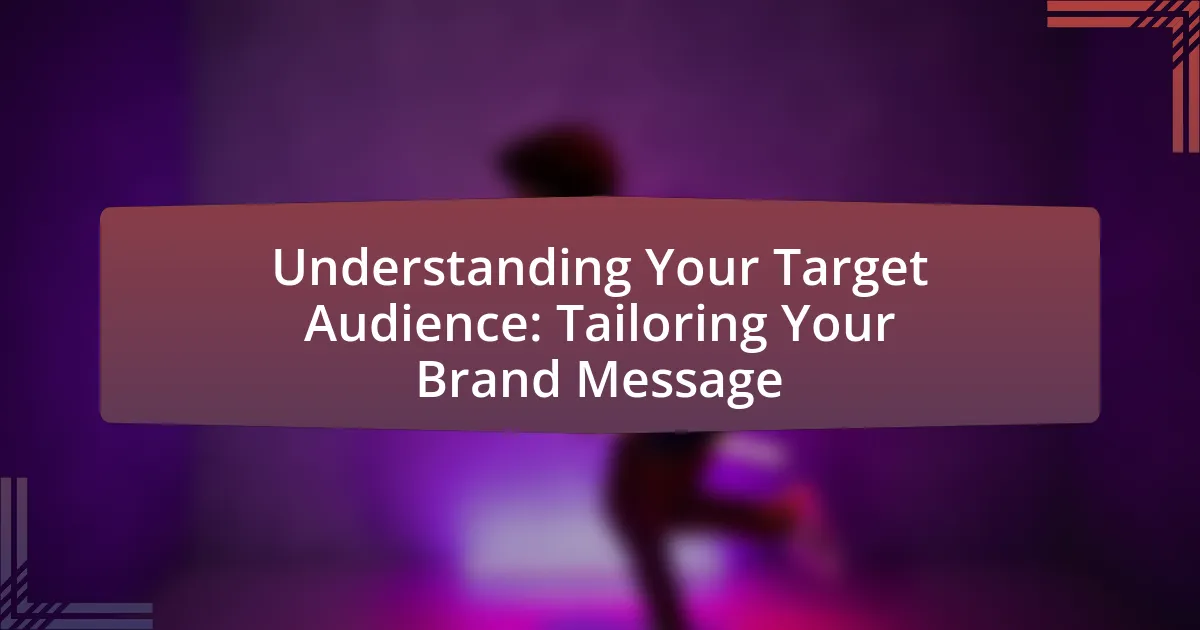The article focuses on the future of personal branding for musicians in the digital age, emphasizing the strategic creation of a unique identity that resonates with audiences through online platforms. It explores the evolution of personal branding from traditional marketing to a digital-centric approach, highlighting key elements such as authenticity, online presence, audience engagement, and visual identity. The article also discusses the influence of social media on branding strategies, the importance of audience engagement, and the advantages of a strong personal brand, including increased visibility and opportunities for collaboration. Additionally, it addresses current trends, best practices, and common pitfalls musicians should avoid to maintain authenticity and effectively connect with their audience.
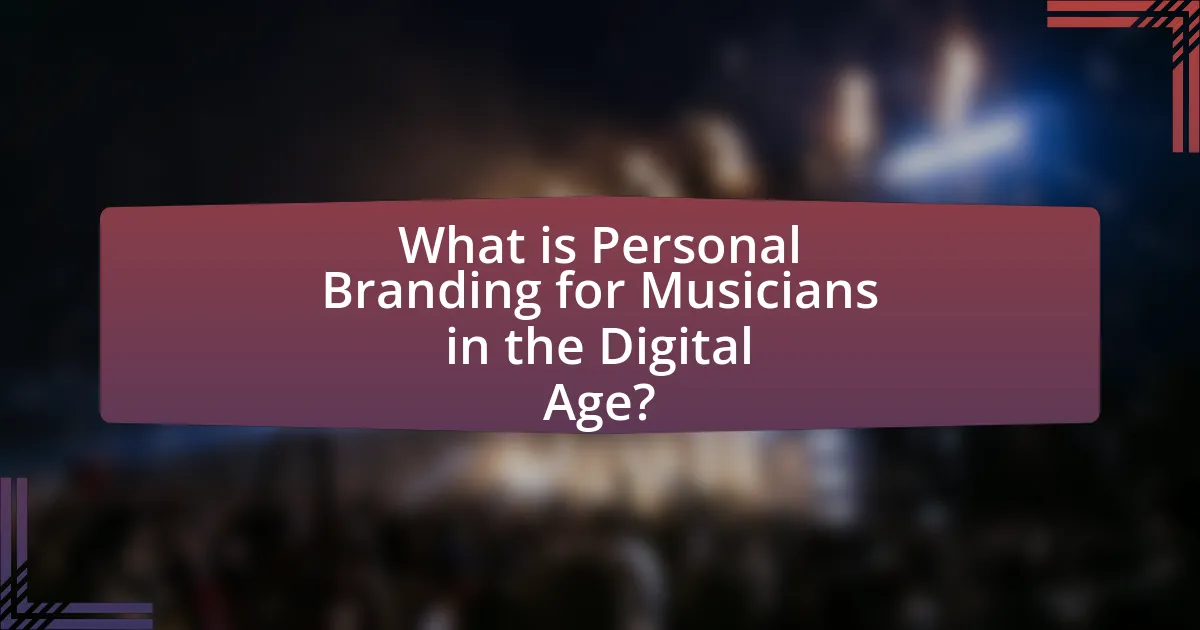
What is Personal Branding for Musicians in the Digital Age?
Personal branding for musicians in the digital age refers to the strategic process of creating a unique identity and image that resonates with audiences through online platforms. This involves utilizing social media, streaming services, and personal websites to showcase music, personality, and values, thereby establishing a recognizable presence in a competitive industry. According to a 2021 survey by the Music Industry Research Association, 85% of musicians reported that their online presence significantly impacted their ability to connect with fans and secure opportunities. This highlights the importance of personal branding as a vital tool for musicians to differentiate themselves and engage effectively with their audience in the digital landscape.
How has the concept of personal branding evolved for musicians?
The concept of personal branding for musicians has evolved from traditional marketing methods to a more dynamic, digital-centric approach. In the past, musicians relied heavily on record labels and physical media for promotion, but the rise of social media platforms and streaming services has shifted the focus to direct engagement with fans. This evolution allows musicians to curate their image, share personal stories, and interact with audiences in real-time, fostering a more authentic connection. For instance, platforms like Instagram and TikTok enable artists to showcase their personalities and creative processes, which enhances their brand identity and visibility. This shift is supported by data indicating that 70% of consumers feel more connected to brands that engage with them on social media, highlighting the importance of personal branding in the digital age for musicians.
What are the key elements of personal branding for musicians today?
The key elements of personal branding for musicians today include authenticity, online presence, audience engagement, and visual identity. Authenticity allows musicians to connect genuinely with their audience, fostering trust and loyalty. A strong online presence, particularly on social media platforms, is crucial for visibility and interaction, as 90% of musicians report using social media to promote their work. Audience engagement through direct communication and interactive content enhances fan relationships and builds community. Lastly, a cohesive visual identity, including logos, album art, and personal style, helps musicians stand out in a crowded market, as studies show that consistent branding can increase recognition by up to 80%.
How do digital platforms influence personal branding strategies?
Digital platforms significantly influence personal branding strategies by providing musicians with tools to directly engage with their audience and showcase their unique identities. These platforms, such as social media and streaming services, allow artists to curate their image, share content, and interact with fans in real-time, which enhances their visibility and relatability. For instance, a study by the Berklee College of Music found that 80% of musicians use social media to promote their brand, indicating its critical role in shaping public perception. Additionally, platforms like Instagram and TikTok enable musicians to leverage visual storytelling, which can lead to viral moments that amplify their brand reach.
Why is personal branding important for musicians in the digital landscape?
Personal branding is crucial for musicians in the digital landscape because it helps them establish a unique identity that resonates with their audience. In an era where digital platforms dominate music consumption, a strong personal brand allows musicians to differentiate themselves from countless others, fostering a loyal fan base. According to a study by the International Federation of the Phonographic Industry, 75% of music consumers engage with artists on social media, highlighting the importance of a recognizable and relatable brand. This engagement not only enhances visibility but also creates opportunities for collaboration, sponsorships, and increased revenue streams.
What advantages does a strong personal brand provide to musicians?
A strong personal brand provides musicians with enhanced visibility and a loyal fan base. This visibility allows musicians to differentiate themselves in a saturated market, making it easier to attract attention from potential listeners and industry professionals. For instance, artists like Taylor Swift and Beyoncé have successfully leveraged their personal brands to create dedicated followings, resulting in increased album sales and concert attendance. Additionally, a well-defined personal brand can lead to lucrative partnerships and sponsorships, as brands seek to align with artists who resonate with their target audience. This alignment is evident in the collaborations between musicians and major brands, which often result in significant financial benefits for the artists involved.
How does personal branding impact a musician’s career trajectory?
Personal branding significantly impacts a musician’s career trajectory by shaping their public image and audience perception. A strong personal brand helps musicians differentiate themselves in a saturated market, leading to increased visibility and opportunities. For instance, musicians with well-defined brands often attract larger fan bases, secure lucrative endorsements, and gain access to exclusive collaborations. According to a study by the Berklee College of Music, musicians who actively manage their personal brands are 30% more likely to achieve commercial success compared to those who do not. This correlation underscores the importance of personal branding in navigating the competitive landscape of the music industry.
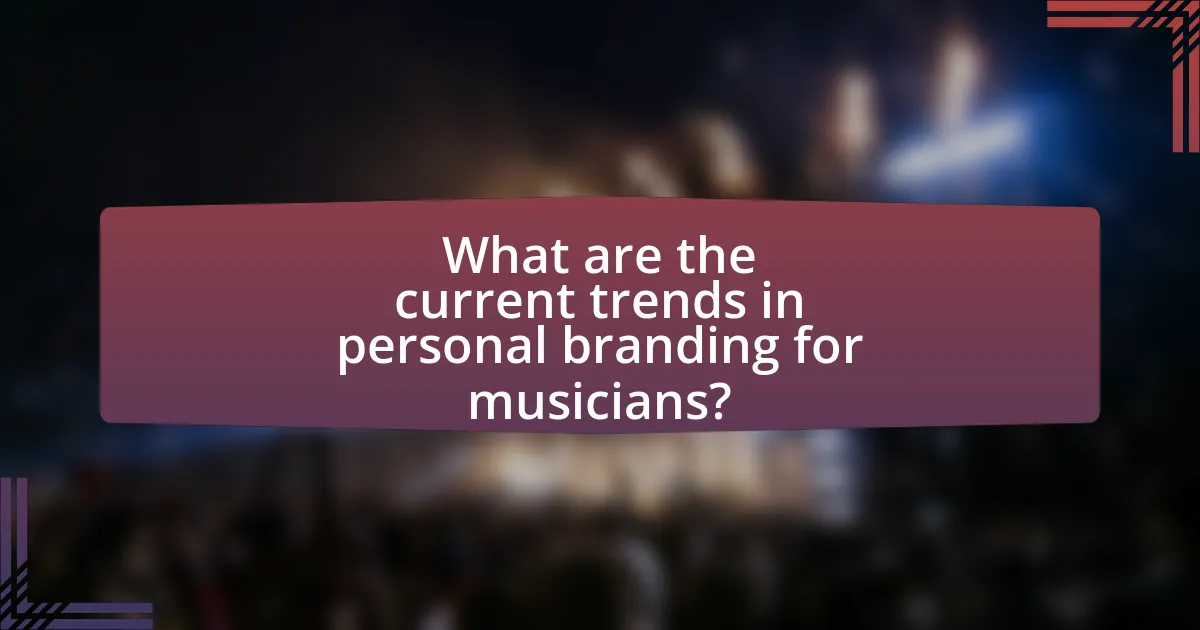
What are the current trends in personal branding for musicians?
Current trends in personal branding for musicians include the use of social media platforms for direct engagement with fans, the creation of unique visual identities, and the incorporation of storytelling in their music and marketing. Musicians increasingly leverage platforms like TikTok and Instagram to showcase their personalities and connect with audiences, as evidenced by the rise of viral music challenges and behind-the-scenes content. Additionally, musicians are focusing on authenticity and transparency, which resonate with audiences seeking genuine connections. According to a 2022 survey by the Music Industry Research Association, 78% of musicians reported that their social media presence significantly impacted their brand perception.
How are social media platforms shaping musicians’ personal brands?
Social media platforms are significantly shaping musicians’ personal brands by providing direct channels for engagement and self-promotion. These platforms enable musicians to share their music, connect with fans, and showcase their personalities, which helps in building a unique brand identity. For instance, artists like Billie Eilish and Lil Nas X have effectively utilized platforms like Instagram and TikTok to cultivate their images and reach wider audiences, leading to increased visibility and fan loyalty. According to a 2021 report by the International Federation of the Phonographic Industry, 75% of music consumers discover new artists through social media, highlighting its critical role in brand development.
Which social media platforms are most effective for musicians’ branding?
Instagram, TikTok, and YouTube are the most effective social media platforms for musicians’ branding. Instagram allows musicians to showcase their visual identity and engage with fans through stories and posts, with over 1 billion monthly active users, making it a key platform for brand visibility. TikTok’s algorithm promotes viral content, enabling musicians to reach a wider audience quickly; it has over 1 billion users and is particularly effective for music discovery. YouTube serves as a primary platform for music videos and long-form content, boasting over 2 billion monthly users, which helps musicians build a loyal fanbase and monetize their content through ads and subscriptions. These platforms collectively enhance musicians’ branding by facilitating direct interaction with fans and providing tools for creative expression.
What content strategies work best for musicians on social media?
Engaging content strategies that work best for musicians on social media include consistent posting, interactive content, and behind-the-scenes glimpses. Consistent posting helps maintain audience interest and engagement, with studies showing that brands that post regularly see a 50% increase in engagement rates. Interactive content, such as polls and Q&A sessions, fosters community involvement and strengthens fan relationships, as evidenced by a 2022 survey indicating that 70% of users prefer brands that engage with them directly. Additionally, sharing behind-the-scenes content humanizes musicians and builds a deeper connection with fans, which can lead to increased loyalty and support.
What role does audience engagement play in personal branding?
Audience engagement is crucial in personal branding as it fosters a connection between the individual and their audience, enhancing visibility and loyalty. Engaging with an audience allows musicians to build a community, receive feedback, and create a sense of belonging, which can lead to increased support and advocacy for their brand. Research indicates that brands with high audience engagement see a 20% increase in customer loyalty and a 30% increase in sales, demonstrating the tangible benefits of active interaction. Thus, effective audience engagement not only strengthens personal branding but also drives measurable success in the digital landscape.
How can musicians effectively connect with their audience online?
Musicians can effectively connect with their audience online by utilizing social media platforms to engage directly with fans. Engaging content, such as live streams, Q&A sessions, and behind-the-scenes glimpses, fosters a sense of community and personal connection. According to a 2021 report by the International Federation of the Phonographic Industry, 80% of music consumers engage with artists on social media, highlighting its importance in building relationships. Additionally, consistent interaction through comments and messages enhances audience loyalty and encourages sharing, further expanding reach.
What are the best practices for building a loyal fanbase?
To build a loyal fanbase, musicians should prioritize authentic engagement with their audience. Engaging directly through social media, responding to comments, and sharing personal stories fosters a sense of community and connection. Research indicates that 70% of consumers feel more connected to brands that engage with them on social media, highlighting the importance of interaction in building loyalty. Additionally, offering exclusive content, such as behind-the-scenes access or early releases, can enhance fan investment. A study by the Music Industry Research Association found that fans who receive exclusive content are 50% more likely to remain loyal to an artist. Consistency in branding and communication also reinforces trust, as fans appreciate reliability in their interactions.
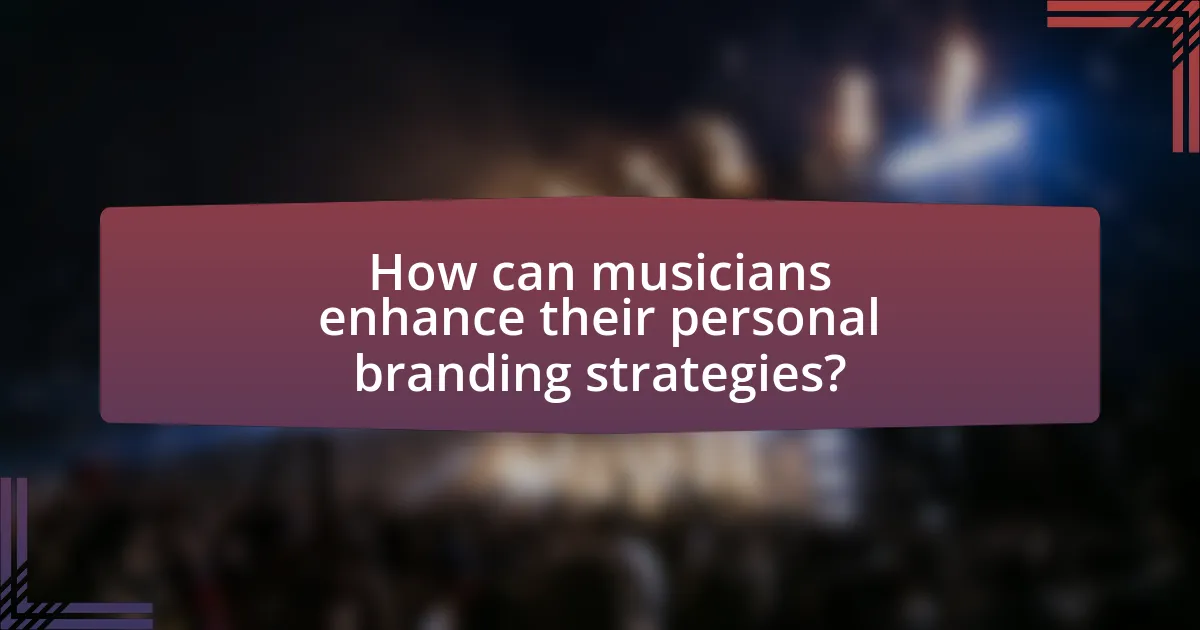
How can musicians enhance their personal branding strategies?
Musicians can enhance their personal branding strategies by leveraging social media platforms to engage directly with their audience. By consistently sharing authentic content, such as behind-the-scenes footage, personal stories, and interactive posts, musicians can build a loyal fan base. Research indicates that 70% of consumers feel more connected to brands that share their values, highlighting the importance of authenticity in branding. Additionally, collaborating with other artists and influencers can expand their reach and introduce them to new audiences, further solidifying their brand identity in the competitive digital landscape.
What tools and resources are available for musicians to build their brand?
Musicians can utilize various tools and resources to build their brand, including social media platforms, music distribution services, and branding agencies. Social media platforms like Instagram, Facebook, and TikTok allow musicians to engage with fans, share content, and promote their music effectively. Music distribution services such as DistroKid and TuneCore enable artists to release their music on major streaming platforms, increasing visibility. Additionally, branding agencies can provide professional guidance on image development and marketing strategies, helping musicians create a cohesive brand identity. These resources are essential for musicians aiming to establish a strong presence in the digital age.
How can musicians leverage analytics to improve their branding efforts?
Musicians can leverage analytics to improve their branding efforts by utilizing data insights to understand audience preferences and engagement patterns. By analyzing metrics from streaming platforms, social media, and website traffic, musicians can identify which content resonates most with their fans, allowing them to tailor their branding strategies accordingly. For instance, a study by Nielsen Music found that artists who actively engage with their audience through targeted social media campaigns see a 30% increase in fan interaction. This data-driven approach enables musicians to refine their messaging, optimize their promotional efforts, and ultimately strengthen their brand identity in the competitive digital landscape.
What role do collaborations play in enhancing a musician’s brand?
Collaborations significantly enhance a musician’s brand by expanding their audience reach and increasing visibility. When musicians collaborate with other artists, they tap into each other’s fan bases, which can lead to a broader listener demographic. For instance, a study by Nielsen Music found that collaborations can increase streaming numbers by up to 50%, demonstrating the tangible impact on audience engagement. Additionally, partnerships with brands or other musicians can elevate a musician’s credibility and marketability, as seen with artists like Travis Scott, who successfully collaborated with McDonald’s, resulting in a notable boost in brand recognition and sales. Thus, collaborations serve as a strategic tool for musicians to strengthen their brand presence in a competitive digital landscape.
What are the common pitfalls musicians should avoid in personal branding?
Musicians should avoid inconsistency in their branding, as it can confuse their audience and dilute their identity. Consistency across platforms, including social media, music releases, and promotional materials, is crucial for building a recognizable brand. Additionally, neglecting audience engagement can lead to a disconnect; musicians who fail to interact with fans miss opportunities to foster loyalty and community. Overemphasis on commercialism can also alienate listeners; musicians should balance authenticity with marketing efforts to maintain genuine connections. Lastly, ignoring analytics and feedback can hinder growth; musicians who do not analyze their brand performance may miss critical insights that could enhance their strategy.
How can musicians maintain authenticity while branding themselves?
Musicians can maintain authenticity while branding themselves by staying true to their artistic vision and values. This involves creating content that reflects their genuine experiences and emotions, rather than conforming to market trends or external pressures. For instance, artists like Billie Eilish have successfully built their brand by embracing their unique style and personal narratives, which resonate deeply with their audience. Research indicates that authenticity in branding fosters stronger connections with fans, leading to increased loyalty and engagement. A study published in the Journal of Marketing found that consumers are more likely to support brands that they perceive as authentic, highlighting the importance of genuine self-representation in a musician’s branding strategy.
What mistakes can undermine a musician’s personal brand?
Mistakes that can undermine a musician’s personal brand include inconsistent messaging, lack of engagement with fans, and poor social media management. Inconsistent messaging can confuse audiences and dilute brand identity, as seen when artists shift their musical style without clear communication, leading to a loss of loyal followers. Lack of engagement with fans can create a disconnect, as research indicates that 78% of consumers feel more loyal to brands that engage with them on social media. Poor social media management, such as infrequent posting or negative interactions, can damage a musician’s reputation, as negative comments can spread quickly and affect public perception.
What practical tips can musicians implement for effective personal branding?
Musicians can implement several practical tips for effective personal branding, including defining a unique artistic identity, engaging consistently on social media, and creating high-quality visual content. Defining a unique artistic identity helps musicians stand out in a saturated market; for example, artists like Billie Eilish have successfully branded themselves through distinct aesthetics and themes. Engaging consistently on social media platforms, such as Instagram and TikTok, allows musicians to connect with fans and build a loyal following; studies show that artists who post regularly see increased engagement and fan interaction. Additionally, creating high-quality visual content, such as music videos and promotional images, enhances a musician’s brand perception, as evidenced by the success of visually striking campaigns by artists like Dua Lipa. These strategies collectively contribute to a strong personal brand in the digital age.
How can musicians create a cohesive online presence across platforms?
Musicians can create a cohesive online presence across platforms by maintaining consistent branding elements such as logos, color schemes, and messaging. This consistency helps audiences easily recognize the musician across different social media platforms, streaming services, and websites. For example, a study by the International Journal of Music Business Research found that artists with uniform branding across platforms experienced a 30% increase in fan engagement. Additionally, musicians should utilize similar usernames and handles on all platforms to enhance discoverability and reinforce their identity. By integrating these strategies, musicians can effectively build a unified online persona that resonates with their audience.
What strategies can musicians use to adapt their branding over time?
Musicians can adapt their branding over time by regularly engaging with their audience through social media, evolving their musical style, and collaborating with other artists. Engaging with fans on platforms like Instagram and TikTok allows musicians to receive real-time feedback and adjust their branding accordingly. Additionally, evolving their musical style can attract new listeners while retaining existing fans, as seen with artists like Taylor Swift, who transitioned from country to pop. Collaborations with diverse artists can also introduce musicians to new audiences and refresh their brand image, exemplified by the success of collaborations in the music industry that often lead to increased visibility and relevance.
